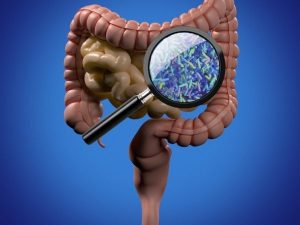
The potential influence of diet and lifestyle on quality of life for individuals with MS has received considerable focus within the MS and neurological research community. Recently, in the ECTRIMS Hub, we noted how studies in the Netherlands [1] and Italy [2] demonstrated physical and mental health benefits for patients with MS adhering to dietary guidance. The role of nutritional factors and physical activity in the pathogenesis of MS has also been examined in a recent narrative review [3], which concluded that dietary approaches such as the Mediterranean diet, in combination with exercise, can provide positive effects on disease course and patient wellbeing.
In this article, we consider some recent findings around the role of diet and lifestyle in MS pathogenesis and examine whether the bacteria in our gut could play a role in disease modulation.
The role of diet in MS
The plant-rich Mediterranean diet has been shown to confer numerous health benefits in many chronic diseases [4]. Dietary habits such as those enshrined in the Mediterranean diet, including consumption of at least five vegetable and two fruit servings per day, together with infrequent consumption of processed or fatty meats, full-fat milk, cakes, biscuits, and takeaway foods, are considered to represent a high-quality diet [5]. Improved diet quality, allied with reduced consumption of meat, have been shown to be associated with reduced disability progression [6] in individuals with MS, with long-term adherence to a higher quality diet [7] correlated with improved wellbeing.
Adherence to a Mediterranean diet has also been demonstrated to improve fatigue severity [8] in individuals with MS. In addition, there is emerging evidence that not only might the Mediterranean diet [9] help to protect brain tissue from further damage in individuals with MS, but that this dietary approach may be helpful in preventing MS [10]. A recently published, retrospective, case-control study from Iran suggested that adherence to a Mediterranean diet significantly reduced the odds of developing MS. It will be interesting to see whether well-designed, randomised, controlled trials (RCTs) are able to demonstrate the same benefits.
Benefits of exercise in individuals with MS
 A recently published RCT to investigate the effects of exercise therapy early in the disease course [11] noted that, despite improvements in aerobic fitness in those in the exercise arm of the study, there were no differences in relapse rates. Nonetheless, exercise has been shown to confer benefits for individuals with MS, including assisting with symptom management, restoring function, improving quality of life and promoting wellbeing [12]. However, physicians do not always encourage their patients to undertake exercise and physical activity, and patients may have concerns relating to health deterioration or fatigue [13]. Both yoga [14] and aquatic exercise [15] have been shown to confer benefits upon individuals with MS, including improvements in their quality of life.
A recently published RCT to investigate the effects of exercise therapy early in the disease course [11] noted that, despite improvements in aerobic fitness in those in the exercise arm of the study, there were no differences in relapse rates. Nonetheless, exercise has been shown to confer benefits for individuals with MS, including assisting with symptom management, restoring function, improving quality of life and promoting wellbeing [12]. However, physicians do not always encourage their patients to undertake exercise and physical activity, and patients may have concerns relating to health deterioration or fatigue [13]. Both yoga [14] and aquatic exercise [15] have been shown to confer benefits upon individuals with MS, including improvements in their quality of life.
The recent COVID-19 pandemic has had a negative impact upon exercise routines. While online versions of face-to-face activities have been beneficial in some settings, and have been shown to support exercise for individuals with moderate-to-severe MS [16], there can be limitations to their usefulness for those with visual or dexterity impairments.
The role of the gut microbiome in inflammation
 The human microbiome, the population of microbes (mostly bacteria) which live in and on our bodies, mainly in the gut [17], has been found to play a key role in health and disease.
The human microbiome, the population of microbes (mostly bacteria) which live in and on our bodies, mainly in the gut [17], has been found to play a key role in health and disease.
Negative changes to the microbiome, known as dysbiosis, can induce inflammatory autoimmune diseases, including diabetes, muscular dystrophy, and multiple sclerosis [18]. A recent study examined the composition of the gut microbiome of individuals with MS comparative to that of their household relatives [19] to exclude environmental factors that might affect the microbiome. This analysis demonstrated gut microbial dysbiosis in individuals with MS, with shared microbial components observed between patients. Multi-system alterations [20] have been observed in the gut microbiota, immune and blood metabolome of MS patients at global and individual feature levels, with complex interactions between mast cells, platelets, microbiota and inflammation hypothesised [21].
The potential role of the microbiome in many chronic illnesses is a growing area of research, and further delineation of its influence in MS, together with exploration of the role of diet in modulating dysbiosis, is expected in the future.
Promoting continued advances in research
ECTRIMS welcomes these new insights into the role of diet, exercise and the microbiome in MS pathophysiology, and applauds the efforts of the scientific community to constantly innovate to improve basic and clinical research in MS. We remain optimistic that ongoing research will bring with it greater advances to improve the outlook and quality of life for people with MS.
***
ECTRIMS Insights articles are produced with an intent of being a neutral source of information sharing and objective analysis for the MS and neuroscience community. Unless otherwise stated, cited information in our articles does equivocate official endorsement from ECTRIMS.
REFERENCES
[1] Evers I, et al. Nutritional Neuroscience. 2021; doi: 10.1080/1028415X.2021.1885240.
[2] Esposito S, et al. Mult Scler Relat Disord. 2021; 47:102636.
[3] Fanara S, et al. Nutrients. 2021 Oct 25;13(11):3774.
[4] Tosti V, et al. J Gerontol A Biol Sci Med Sci. 2018 Mar 2;73(3):318–326.
[5] Hadgkiss EJ, et al. Nutr Neurosci. 2015 Apr;18(3):125-36.
[6] Simpson-Yap S, et al. Eur J Neurol. 2022 Jan;29(1):225–236.
[7] Simpson-Yap S, et al. Mult Scler Relat Disord. 2022 Feb 21;60:103710.
[8] Ertaş Öztürk Y, et al. Nutr Neurosci. 2022 Feb 10:1–7.
[9] Katz Sand IB, et al. Mult Scler Relat Disord. 2021; 53:103031.
[10] Noormohammadi M, et al. Neurol Ther. 2022 Mar;11(1):397–412.
[11] Riemenschneider M, et al. Mult Scler. 2022 Mar 16:13524585221079200.
[12] Motl RW, et al. Lancet Neurol. 2017 Oct;16(10):848–856.
[13] Perenc L, et al. J Res Med Sci. 2022 Jan 29;27:2.
[14] Palukuru S, et al. Ann Neurosci. 2021 Jan;28(1–2):29–38.
[15] Chen MH, et al. Mult Scler Relat Disord. 2022 Feb 20;60:103701.
[16] Knox KB, et al. Disabil Rehabil. 2022 Mar 28:1–7.
[17] Wang B, et al. Engineering. 2017;3:71–82.
[18] Center for Ecogenetics and Environmental Health. Fast Facts About The Human Microbiome. Available at: https://depts.washington.edu/ceeh/downloads/FF_Microbiome.pdf. Last accessed April 2022.
[19] Galluzzo P, et al. Life (Basel). 2021 Jun 26;11(7):620.
[20] Cantoni C, et al. EBioMedicine. 2022 Feb;76:103798.
[21] Cocchi M, et al. Int J Mol Sci. 2022 Mar 17;23(6):3253.